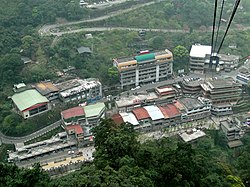Wulai District
|
Wulai 烏來區 |
|
|---|---|
| Mountain Indigenous District | |
| Wulai District | |
 |
|
 Wulai District in New Taipei City |
|
| Country | Taiwan |
| Municipality | New Taipei City |
| Boroughs |
List
|
| Government | |
| • Type | District government |
| • District chief | Kao Fu-kuang (Ind.) |
| Population (January 2016) | |
| • Total | 6,182 |
Wulai District (Chinese: 烏來區; pinyin: Wūlái Qū; Pe̍h-ōe-jī: U-lai-khu) is a mountain indigenous district in southern New Taipei City in northern Taiwan. It sits near the border with Taipei and is famous for its hot springs. It is the largest district in New Taipei, as well as the most mountainous, and is home to the Atayal people of the Taiwanese aborigines.
The name of the town derives from the Atayal phrase kilux ulay meaning "hot and poisonous" when an Atayal aborigine was hunting by a stream and saw mist coming from the stream.
Formerly classified as "Savage Land" under Taihoku Prefecture during Japanese rule.
In August 2015, Wulai was devastated by Typhoon Soudelor, wiping out several hotels and destroying hot springs in the region. Course of the Nanshi River that passes through the district has changed and the riverbank was eroded heavily by surging water. Heavy landslides were attributed to the overdevelopment of the mountain areas around the river which damaged the soil and watershed along the slope lands.
Zhongzhi Village, Wulai Village, Xiaoyi Village, Xinxian Village and Fushan Village.
Wulai is a tourist town most renowned for its hot springs, sightseeing, and aboriginal culture. Other activities include hiking, camping, swimming, fishing, and birdwatching. During the spring, visitors come see the cherry trees bloom. According to locals, bathing in the odorless hot springs can cure skin diseases (such as ringworm, eczema, and herpes).
...
Wikipedia
